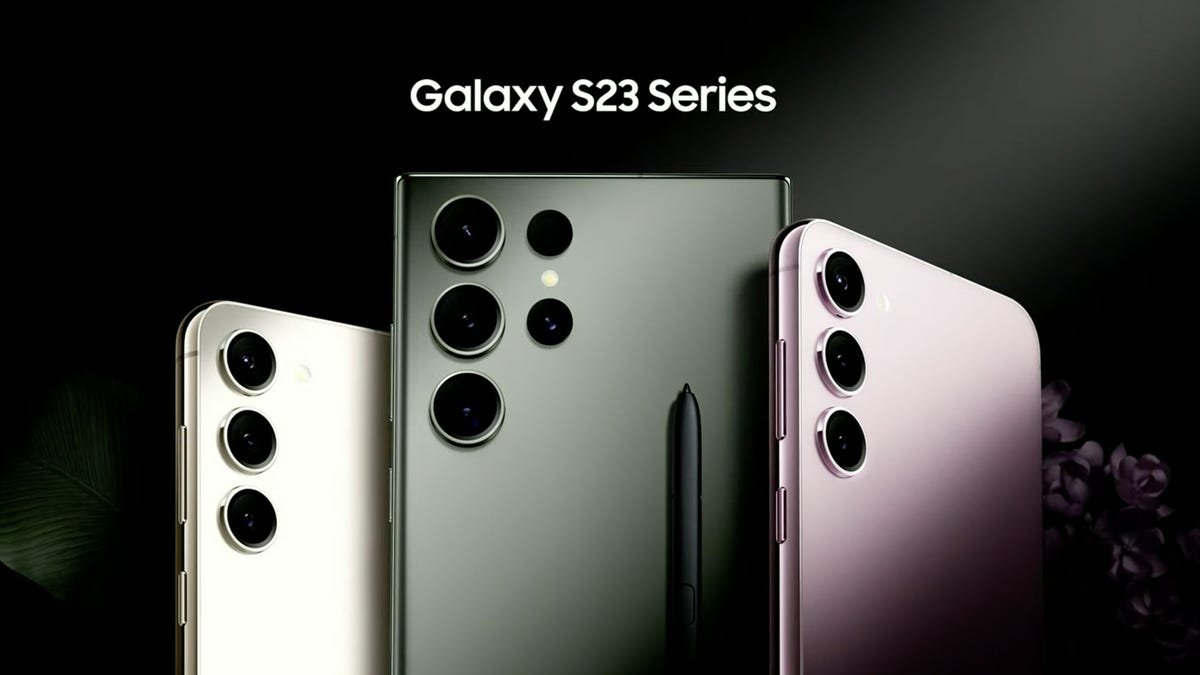
Samsung’s Galaxy S23 Base, Plus, and Ultra: A Spec-By-Spec Comparison of Each Phone
[ad_1]
Samsung’s upcoming Galaxy S24 lineup is rumored to launch early this year. But the Galaxy S23 series, unveiled at the company’s Unpacked event last February, is still the current flagship series and still has phones worth considering in 2024, especially if and when the price drops.
The S23 lineup consists of three models: the Galaxy S23, Galaxy S23 Plus and the top-specced Galaxy S23 Ultra. So, what are the differences between each model?
Starting prices for the phones, at least in the US, remain the same as 2022, with the base Galaxy S23 starting at $800 (£849, AU$1,349), bumping up to $1,000 (£1,049, AU$1,649) for the Galaxy S23 Plus and maxing out at $1,200 (£1,249, AU$1,949) for the Galaxy 23 Ultra.
Samsung has increased prices in the UK and Australia, however, among other countries and regions. For example, the starting price of the base Galaxy S23 has increased in the UK by £80 compared to the launch price of the Galaxy S22. In Australia, the base S23 model received a AU$100 bump.
The three devices share a similar glass and aluminum design. They use the same processor (the Snapdragon 8 Gen 2), have the same display adaptive refresh rate (up to 120Hz) and 12-megapixel selfie camera. The three phones support ultrawideband, a radio technology that powers features such as using digital car keys and lost item tracking.
The S23 is the smallest of the three, weighing 168 grams (5.93 ounces) with a 6.1-inch AMOLED display. The S23 Plus has a 6.6-inch screen and the S23 Ultra has a 6.8-inch display. They weigh 195 grams (6.88 ounces) and 234 grams (8.25 ounces) respectively.
The Galaxy S23 Ultra has a four-camera module, with a 200-megapixel main camera, two 10-megapixel telephoto cameras and a 12-megapixel ultrawide lens. According to Samsung’s product pages, these sensors have improved resolution (obviously), but also improve the phone’s low-light photography by combining sets of smaller pixels into larger individual ones that can capture more light.
Watch this: Samsung’s Galaxy S23 Lineup Is Here With Big Camera Upgrades
The S23 and S23 Plus have identical triple-camera setups on the rear. Both include a telephoto lens, which should be helpful for capturing faraway subjects. You can learn more about the camera specs in our chart below.
The Galaxy S23 Ultra’s new Note-like features set it apart from both the rest of the S23 lineup and other premium phones made by competitors such as Apple and Xiaomi. It’s the second time a Galaxy S Ultra phone has come with a stylus included in the box. There’s also a slot for storing it on the phone — just like Samsung’s all-but-discontinued Note series. S Pen fans who bought the Galaxy S21 Ultra had to pay for the stylus separately and find a specific phone case that could store it.
For more information on the similarities and differences between the Samsung Galaxy S23 lineup, look at our specs chart below.
Galaxy S23 lineup compared
| Galaxy S23 | Galaxy S23 Plus | Galaxy S23 Ultra | |
|---|---|---|---|
| Display size, resolution, refresh rate | 6.1-inch AMOLED; 2,340×1,080 pixels; 120Hz | 6.6-inch AMOLED; 2,340×1,080 pixels; 120Hz | 6.8-inch AMOLED; 3,088×1,440 pixels; 120Hz |
| Display pixel density | 425 ppi | 393 ppi | 500 ppi |
| Size (inches) | 2.79 x 5.76 x 0.3 in | 3 x 6.21 x 0.3 in | 3.07 x 6.43 x 0.35 in |
| Size (millimeters) | 70.9 x 146.3 x 7.6 mm | 76.2 x 157.7 x 7.6 mm | 78 x 163.3 x 8.9 mm |
| Weight (grams, ounces) | 168 g (5.93 oz) | 196 g (6.91 oz) | 234 g (8.25 oz) |
| Operating system | Android 13 | Android 13 | Android 13 |
| Rear cameras | 50-megapixel (wide), 12-megapixel (ultrawide), 10-megapixel (telephoto) | 50-megapixel (wide), 12-megapixel (ultrawide), 10-megapixel (telephoto) | 200-megapixel (wide), 12-megapixel (ultrawide) 10-megapixel (telephoto) 10-megapixel (telephoto) |
| Front camera | 12-megapixel | 12-megapixel | 12-megapixel |
| Video capture | 8K | 8K | 8K |
| Processor | Qualcomm Snapdragon 8 Gen 2 for Galaxy | Qualcomm Snapdragon 8 Gen 2 for Galaxy | Qualcomm Snapdragon 8 Gen 2 for Galaxy |
| RAM and storage options | 8GB RAM + 128GB; 8GB RAM + 256GB | 8GB + 256GB; 8GB + 512GB | 8GB + 256GB; 12GB + 256GB; 12GB + 512GB; 12GB + 1TB |
| Battery capacity and charging rate | 3,900 mAh (25W wired charging) | 4,700 mAh (45W wired charging) | 5,000 mAh (45W wired charging) |
| Charging port | USB-C | USB-C | USB-C |
| Other features | 5G (mmw/Sub6), IP68 rating, wireless PowerShare to charge other devices | 5G (mmw/Sub6), IP68 rating, wireless PowerShare to charge other devices, UWB for finding other devices | 5G (mmw/Sub6), IP68 rating, wireless PowerShare to charge other devices, integrated S Pen, 100x Space Zoom, 10x Optical Zoom, UWB for finding other devices |
| US price | $800 (8GB/128GB) | $1,000 (8GB/256GB) | $1,200 (12GB/256GB) |
| UK price | £849 (8GB/128GB) | £1,049 (8GB/256GB) | £1,249 (12GB/256GB) |
| Australian price | AU$1,349 (8GB/128GB) | AU$1,649 (8GB/256GB) | AU$1,949 (12GB/256GB) |
[ad_2]
Source link


